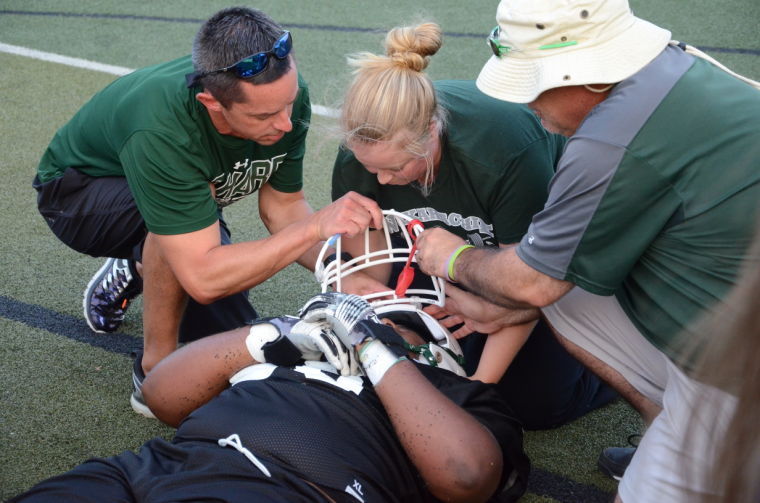
Major sports injuries can happen in the blink of an eye. While some of the most violent collisions on a football field may prove to be harmless, a simple twist of a knee on a softball field can be become a threat to the remainder of a student athlete’s competitive career.
WISD has built one of the most storied legacies in medical student-athlete care in Texas, said David (Doc) Bowdoin, and it started with a simple philosophy in 1961 when Dr. Dave Williams became the district’s sports physician. Keeping kids and community first was a priority for Williams, and that groundwork came into play again Tuesday evening when a football player went down during football practice at Lumpkins Stadium.
Bowdoin, WISD’s veteran head athletic trainer, and his team sprang into action. While the injury was simulated, and the drill known to only a few in the stadium, it was a critical test of WHS student trainers, WISD professional athletic trainers and doctors to address major sports injuries.
“I approached coach Kitna last week about working on an emergency action drill in practice, and he was ecstatic,” said Bowdoin. “He said, ‘Let’s film it, study it and do this right. I want you to take as much time as you need to run the drill,’”
WISD’s assistant athletic trainer Nikki Robinson echoed the benefits of running real-time drills like this.
“Any time you run a drill, you’re going to be better prepared. This year, we have a new style football helmet with a quick-release mechanism on the face mask,” said Robinson. “So we wanted to make sure we were adequately prepared to take that helmet off, and still keep the athlete safe and protected, especially if it’s a head or neck injury.”
Team physician Marc Roux, is an orthopedic surgeon in Waxahachie, and has been on the sidelines of every WHS varsity football game for the last 10 years.
“This type of training gives everyone added confidence. We’re all familiar with one another. I know Doc and Nikki backward and forward, and we all have the same goals,” said Roux. “Doc and I have had a great relationship over the past 10 years, and seven years with Nikki.”
Roux said the respect and professionalism of the athletic training staff has been outstanding.
“One of the things I’ve always been impressed with since I came to Waxahachie 10 years ago is the support that the medical staff has always received from the athletic department,” he said. “They’ve always taken a step back to allow the expertise of the training staff and the physician staff to govern the student-athletes return to play and the athletes rehab process. We’ve never felt any pressure from any coach, and we’ve really seen that philosophy stepped up several notches with the new staff.”
As Tuesday’s drill unfolded, the mock injury required the athletic trainers to immobilize the athlete’s head, and place him on a backboard. Roux was hands-on and giving guidance to the athletic trainers as they moved the athlete onto the backboard. Robinson spoke about the benefits of having a medical physician on the sidelines.
“It makes all the difference in the world, and makes our job much more successful,” said Robinson. “We’ve got somebody who’s going to advise us to make sure that athlete is taken care of, especially in a situation that may come up where we might not have had that type of experience. It makes us a stronger team, and we can make better decisions for the athlete.”
While this philosophy and attention to detail began over 50 years ago with the techniques and skill of Williams, Bowdoin and the athletic training staff have relied on it every day. “Dr. Williams was simply so far ahead of his time when he started as our team physician. He believed in treating the complete student-athlete. Body, mind and soul,” said Bowdoin.
During the course of 50-plus years, Waxahachie has always had a team physician on the sidelines,from Williams, to Dr. Ben Boone, to Dr. Rick Redington and to Roux.
“It’s just something Dr. Williams started, and we’ve always held the belief that we’re a better, stronger team with these guys providing critical direction,” said Bowdoin.
WISD trainers and physicians have also enacted emergency action plans for each WISD athletic venue in the community.
“Richards Park is going to have a different plan for getting first responders in and out of the area than, say, Lumpkins Stadium or J.W. Williams gymnasium. It’s simply a matter of preparation” said Robinson.
Greg Reed, WISD Director of Athletics, noted that trainers don’t have an offseason.
“Bowdoin, Robinson and their student trainers are the life blood our athletic programs,” said Reed. “They, in cooperation with Roux and many other physicians in our community, provide proactive care and acute care to keep our students stay safe and be released back into participation as soon as possible. They attend to athletes early in the morning and late after practice, seven days a week, if that is what our students need.”
Superintendent Jeremy Glenn reiterated the legacy and quality medical capabilities of the trainers and doctors who look after WISD’s student-athletes.
“Since Dr. Williams began his stint as the district team physician back in the ‘60s, WISD has always had one of the most professionally trained and prepared team of trainers and doctors available,” said Glenn. “Their dedication and professionalism is without question, and their first priority has always been the safety of our student athletes. Our community is grateful for the amazing job they perform at all WISD sporting events.”
As the drill wrapped up, players and coaches, who had halted practice while the “injured” athlete was attended to, gave the trainers a round of applause for their work.
ORIGINAL ARTICLE:
http://www.waxahachietx.com/news/waxahachie/on-field-drill-tests-skills-of-wisd-s-athletic-trainers/article_1c735da0-7920-542d-ae8b-005140125dce.html